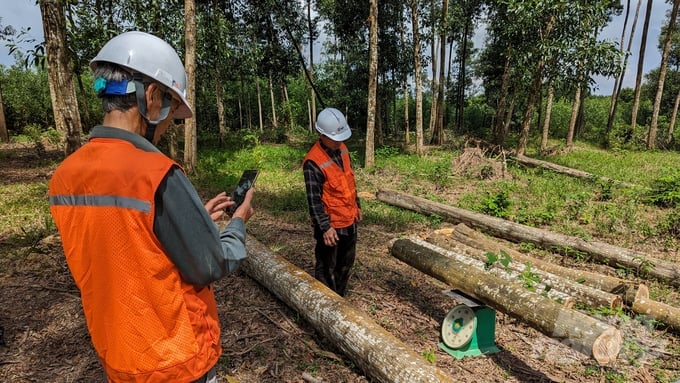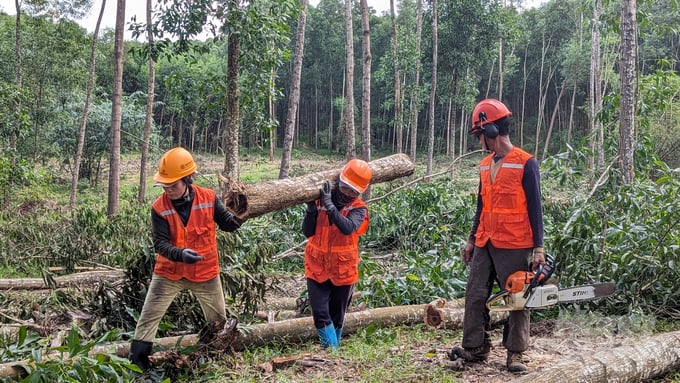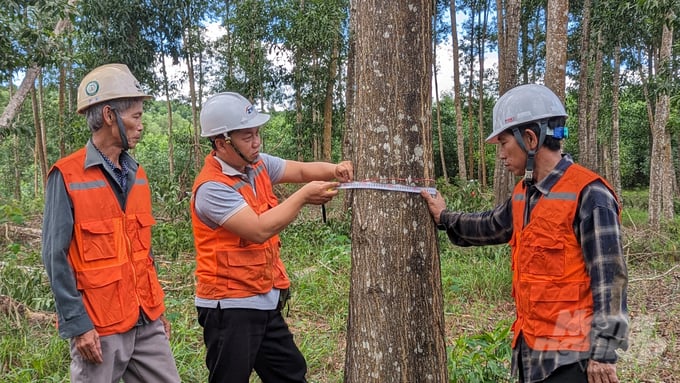October 24, 2025 | 06:02 GMT +7
October 24, 2025 | 06:02 GMT +7
Hotline: 0913.378.918
October 24, 2025 | 06:02 GMT +7
Hotline: 0913.378.918

Numerous large timber forest owners have voiced concerns regarding the market for their products. Photo: Nhat Quang.
According to statistics from the government of Thua Thien - Hue province, the province is currently managing over 12,400 hectares of large timber production forest area, which includes large timber production forests and converted small timber forests. Notably, this area only accounts for 24% of the total planned 50,000 hectares of production forest.
This disparity presents a significant potential for expanding the area of large timber forests and converting existing small timber forests to large timber. However, the development of FSC-certified large timber forests currently faces significant challenges.
Established in 2016, Phu Son Sustainable Forest Owners Association, situated in Phu Son commune, Huong Thuy town, Thua Thien - Hue province, is an active member of the Thua Thien - Hue Sustainable Forest Owners Association. To date, the association's large timber forest area has reached over 730 hectares, with 80 participating members.
The association has continuously encouraged community participation over the years; however, the local large timber forest area remained limited compared to its potential.
Le Trong Dung, a member of the Phu Son Sustainable Forest Owners Association, shared: "The most significant challenge in expanding local large timber forest area lies in the fact that most forest owners are unable to fully recognize the benefits of obtaining forest certification. They are still concerned with securing a market for certified timber."
The fluctuating price of wood chips, which ranges from 1.1 to 1.5 million VND per ton, has discouraged many forest owners from committing to planting large timber forests. Moreover, the majority of forest owners are reluctant to plant large timber production forests due to the risk of breakage during storms and tornadoes, which can ultimately affect the harvesting season.
At present, a significant portion of households in Thua Thien - Hue own small, uncoordinated forest areas with various cultivation methods and business cycles. This lack of organization has prevented the organization and formation of concentrated large timber material areas that can facilitate joint ventures, partnerships, and infrastructure investment.

Businesses in Thua Thien - Hue province are reluctant in purchasing small certified timber. Photo: Cong Dien.
According to Nguyen Quang Hoa, Director of the Phu Son Sustainable Forest Owners Association, one of the organization's major challenges is finding and collaborating with businesses to purchase FSC-certified timber products. Businesses in Thua Thien - Hue province are reluctant in purchasing small certified timber products, such as wood chips and pellets.
Additionally, local forest owners possess limited managerial capacity. Consequently, they rely on hiring costly consultants. Forest owners manage relatively uncoordinated and small-scale forest areas, which result in even higher costs.
In response to this challenge, Thua Thien - Hue province has established a steering committee and multiple district-level working groups to organize mobilization campaigns and training programs for forest owners, cooperatives, community groups, and households, among other participants. Accordingly, the province encourages its residents to participate in planting large timber forests and converting existing small timber forests to large timber.

Thua Thien - Hue province aims to plant 15,000 hectares of various large timber production forest types by 2025. Photo: Cong Dien.
The province is encouraging forest owners to limit the harvesting of young forests, and engage in the trading of large timber forests (over 10 years old) to increase income. Furthermore, Thua Thien - Hue is actively establishing market linkages and developing a product supply chain from production to consumption to connect forest owners with businesses. This initiative aims to facilitate forest owners in collaborative production, access stable markets, and enhance the value-added of plantation timber products.
Thua Thien - Hue province aims to plant 15,000 hectares of various large timber production forest types by 2025. Among this group, local households and residents will manage 12,500 hectares, with the remainder falling under the management of state forest owners.
The Forest Stewardship Council (FSC) is the sole global organization recognized for developing forest certification standards, established to maintain and ensure responsible forest management systems. Its purpose is to minimize deforestation and uncontrolled logging, which can result in the drastic reduction of forest area globally.
After 30 years of operation, FSC has demonstrated its global influence in preventing illegal logging and severe forest destruction. At present, FSC forest certifications are present in over 50 countries and territories, with more than 850 members, including non-governmental organizations, scientific research institutes, international certification bodies, community development centres, and businesses.
Translated by Nguyen Hai Long
/2025/10/23/5928-2-194850_964.jpg)
(VAN) The 'Regenerative cocoa production to support livelihood development in Vietnam' (ReCoPro) project marks an important step toward sustainable cocoa production.

(VAN) Reducing antibiotic dependence in livestock production helps protect public health, enhance food safety, and promote sustainable agricultural development.

(VAN) Experts describe Viet Nam as a 'policy laboratory' within ASEAN, where new agroecological, green finance, and risk-management initiatives are being piloted before wider regional adoption.

(VAN) Limiting rice straw burning and reusing agricultural by-products as materials or fertilizers not only improves soil health but also helps clean the air.

(VAN) ASSET delivers long-term vision and strategy, innovative models, learning networks, policy impact, and measurable environmental benefits.
/2025/10/21/1634-2-111000_41.jpg)
(VAN) A working delegation led by Vice Chairman of the Ho Chi Minh City People's Committee Bui Minh Thanh inspected fishing ports and assessed fishing vessel management work ahead of the EC inspection.

(VAN) Promoting digital transformation in irrigation is to enable early forecasting, modernize management of infrastructure, and enhance production efficiency at all levels.